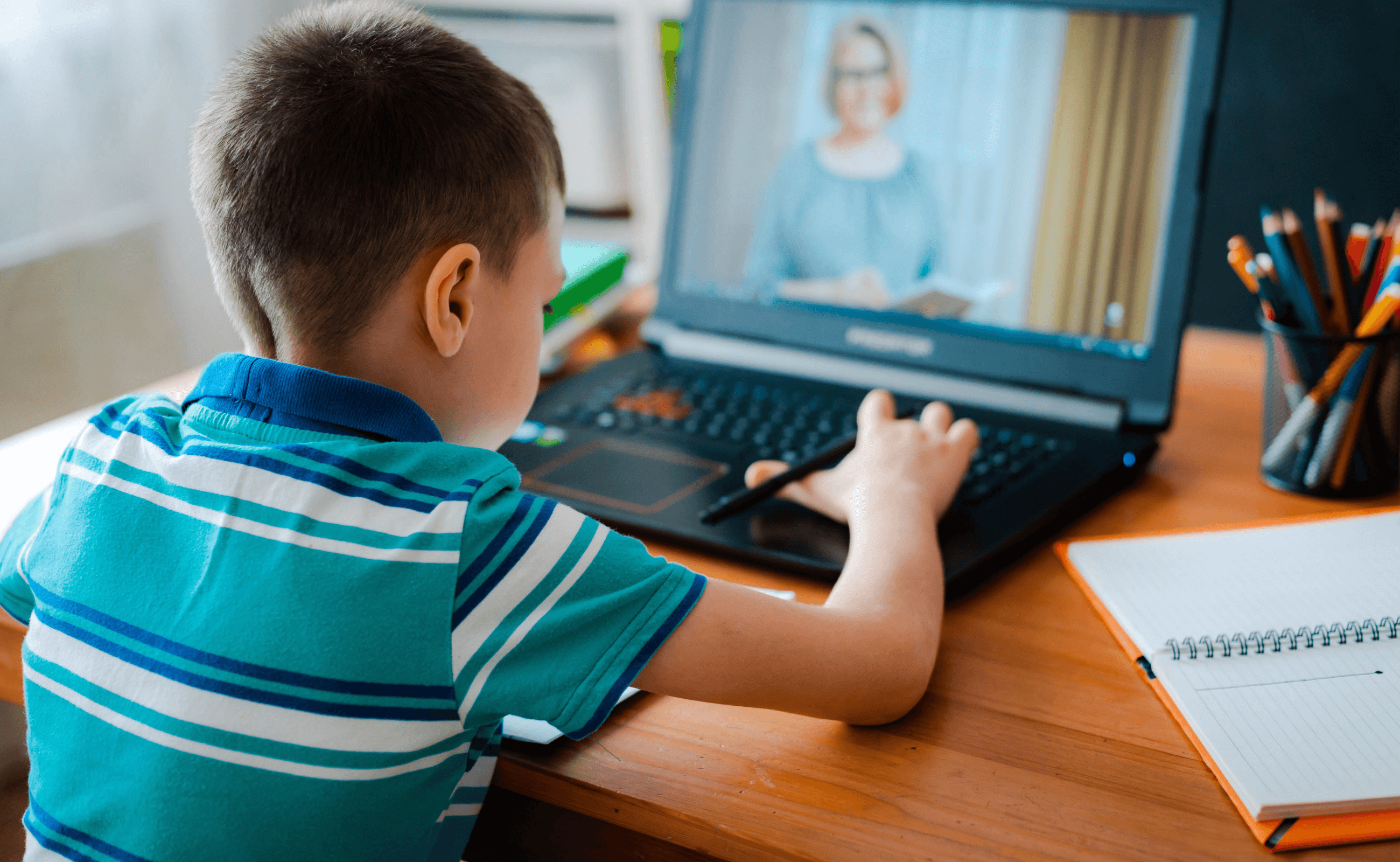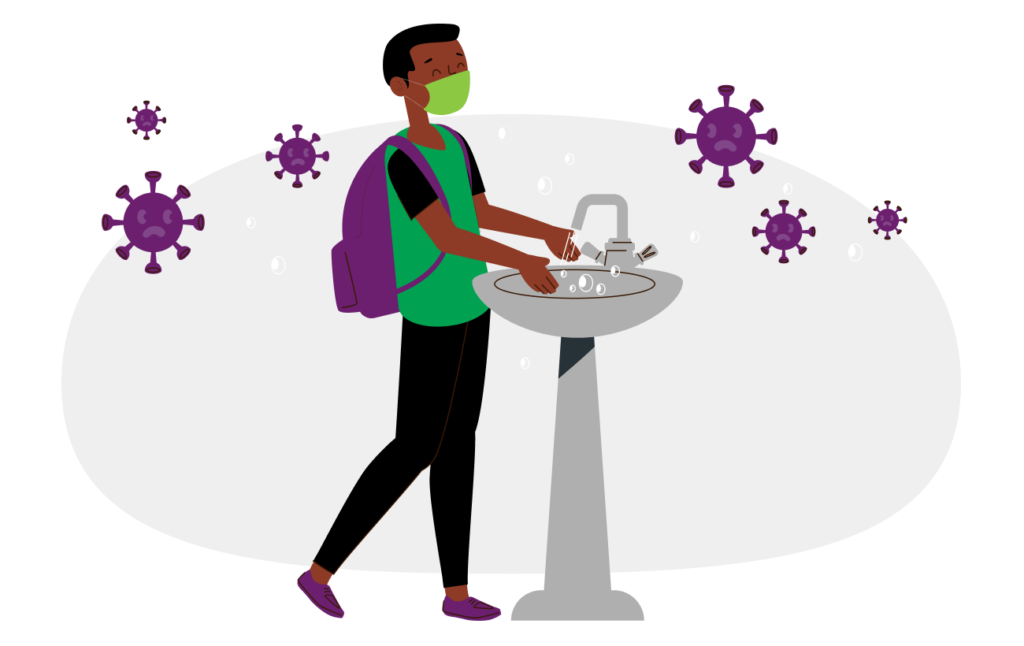Kids, School, and Anxiety During COVID-19

The 2020 school year looks and feels different. Children board school busses wearing masks. Parents of older children with hybrid schedules consisting of remote and in-person learning struggle to keep schedules straight.
The changes, adjustments, and uncertainty can be difficult—especially for children.
CDPHP Behavioral Medical Director of Children’s Services Vanessa Toney Bobb MD, PhD offers insights for parents and caregivers to help their children cope and move forward, as well as information about resources available to CDPHP members.

How can parents or caregivers help kids adjust to the “new normal” at school (whether in-person or online)?
I recommend open communication and conversation with your child. Allow your child space to express thoughts including what they enjoy at school—yet also allow them to share their concerns. Try to use open ended questions (what did you do at school today?), as opposed to closed ended (yes or no) questions.
In addition, it’s important for caretakers to take care of themselves. Children often take their cues from their parents. Research shows that one of the most effective ways of improving children’s wellbeing, is to improve the mental health of the primary caretaker.
All families should remember that “change” is the new normal, and that 2020 has taught us lessons in change, adaptability, the importance of stress management and planning for the unexpected. Practicing these life skills can set the stage for healthy coping throughout your child’s life. However, be kind to yourself and remember that “nobody is perfect.”
What do you recommend that parents/caregivers do when dealing with a child who is particularly anxious?
Recommendations depend on the age of the child and on the severity and length of symptoms. Anxiety symptoms range from typical/normal start of school jitters to severe anxiety. Anxiety is common at the beginning of the school year as children meet new teachers and friends, have increased homework, etc. Usually the child will adjust and anxiety will settle after a week or two. However, sometimes anxiety may reach levels where it interferes with a child’s ability to function and engage in age appropriate activities.
Excessive anxiety may present as separation anxiety (worry and fear about separating from parents), school phobia (anxiety and refusal to attend school), panic attacks (sweating, palpations, nausea), obsessive thoughts and rituals, trouble sleeping, and nightmares.

If a child is struggling now that the fall term is underway, what are some ways to ease his/her stress?
Families should feel free to reach out to teachers and school counselors so that they can assist with the transition. In addition, pediatricians and therapists can also assist with tips, advice, evaluations, therapy, or strategies.
Some coping strategies which families use at home include family time, playing games, coloring, bed-time routines, prayers, mindfulness exercises, warm baths, and calming music.
If schools close again, what strategies do you recommend for helping children to “pivot” and handle the disruption?
It’s important to remind our children that school districts have planned for months to provide a safe school environment. Schools are continuing to monitor things so people stay safe and there are plans in place if someone gets an infection. Parents can also emphasize that scientists are hard at work making a vaccine.
It seems that many times we talk about things falling apart and forget that there are things we can do to boost mental wellness before it gets to that point. What are ways we can boost mental wellness?
Ways to boost mental wellness include practicing gratitude, good nutrition, sufficient sleep, deep breathing, exercise, prayer, mindfulness, music, singing, dancing, laughter, social supports, stress management, having fun, monitoring mood and anxiety, and accepting help
Are there any other tips or information you can share about helping children cope with school while we are still in a pandemic?
I’d like to reiterate that families can reach out to teachers, school counselors, and pediatricians. I also recommend websites like the American Academy of Child and Adolescent Psychiatry and the Child Mind Institute for further information on child and adolescent mental health.
In addition, if caretakers would like to consult a virtual child therapist or child psychiatrist they can utilize telemedicine services from licensed professionals available through Valera Health via their phone or computer. Parents can also attain in-person and virtual referrals via CDPHP Behavioral Health Access Center. Referral information for children, teens, and adults are available.
Vanessa Toney Bobb MD, PhD serves as behavioral health medical director of children’s services for CDPHP. In this role, she oversees the unique behavioral health needs of CDPHP members 21 years of age and younger. She has vast clinical experience within the Columbia and Cornell University Hospital systems, the New York State Office of Mental Health, the Administration for Children’s Services, and within child welfare organizations.
CDPHP Resources:
All of the resources/support services listed below, as well as information about preventive care, wellness classes, healthy eating, and more are available on the CDPHP Family Health webpage.
The CDPHP Behavioral Health Access Center – CDPHP offers personal assistance and a variety of resources for coping with mental health issues. Call the CDPHP Behavioral Health Access Center toll-free at 1-888-320-9584 between 8 a.m. and 6 p.m., Monday through Friday. If at any time you require urgent after-hours support, please call the crisis hotline at 1-855-293-0785.
Valera Health – CDPHP partners with Valera Health, which offers televideo therapy via the Valera Health app. Therapy services are with highly-trained, licensed mental health professionals with expertise in a variety of evidence-based therapy models, including cognitive-behavioral therapy, mindfulness, and more. Valera Health treats a range of pediatric mental health conditions and has board certified child and adolescent psychiatrists.
The CDPHP Care Team – Do you feel like you need help navigating your health, but not sure where to start? The CDPHP Care Team can help. Call member services at the number on your member ID card to be connected with a team member.
 The Daily Dose
The Daily Dose
Comments are closed.